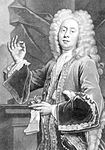
The Squire of Alsatia is a 1688 comedy play by the English writer Thomas Shadwell. Alsatia was a nickname for the Whitefriars area of London, deriving from Alsace in northeastern France. A restoration comedy, it was performed at the Drury Lane Theatre by the United Company following on from John Crowne's Darius, King of Persia. One of the best-remembered roles, that of the shrewish Mrs. Termagant was first performed by Elizabeth Boutell. It was revived numerous times during the eighteenth century.

Greenwich Park is a 1691 comedy play by the English writer William Mountfort.
Regulus is a 1692 tragedy by the English writer John Crowne. It portrays the career of Marcus Atilius Regulus, a Roman Consul at the time of the First Punic War. A separate play of the same title was written by William Havard in 1744.
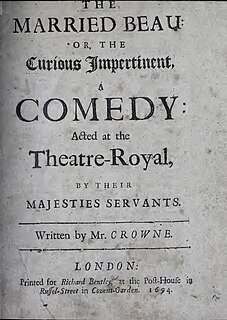
The Married Beau or The Curious Impertinent is a 1694 comedy play by the English writer John Crowne. It is inspired by a passage from Miguel de Cervantes's Don Quixote. Incidental music was composed by Henry Purcell.
The Country Wit is a 1676 comedy play by the English writer John Crowne, part of the tradition of Restoration Comedy. It was first staged at the Dorset Garden Theatre in London by the Duke's Company. The cast included Samuel Sandford as Sir Thomas Rash, Thomas Betterton as Ramble, James Nokes as Sir Mannerly Shallow, Henry Harris as Merry, Cave Underhill as Booby, Matthew Medbourne as Lord Drybone, Anthony Leigh as Rash, Mary Betterton as Lady Faddle, Mary Lee as Christina, Elizabeth Currer as Betty Frisque and Elinor Leigh as Isabella.

Dame Dobson is a 1683 comedy play by the English writer Edward Ravenscroft.
The Marriage-Hater Matched is a comedy play by the English writer Thomas D'Urfey. It was first staged by the United Company at the Theatre Royal, Drury Lane in January 1692. The original cast included John Bowman as Brainless, William Mountfort as Sir Philip Freewit, Samuel Sandford as Limber, John Hodgson as Darewell, Anthony Leigh as Myn Here Van Grin, George Bright as Bias, Thomas Doggett as Solon, William Bowen as Callow, Colley Cibber as Splutter, Elizabeth Barry as Lady Subtle, Katherine Corey as Lady Bumfiddle, Anne Bracegirdle as Phoebe, Charlotte Butler as La Pupsey and Abigail Lawson as Margery.
Sir Anthony Love; Or, The Rambling Lady is a 1690 comedy play by the Irish writer Thomas Southerne. It was originally staged by the United Company at the Theatre Royal, Drury Lane with a cast that included Susanna Mountfort in a breeches role as Sir Anthony Love, William Mountfort as Valentine, Joseph Williams as Ilford, William Bowen as Sir Gentle Golding, Anthony Leigh as An Abbe, John Hodgson as Count Canaile, Samuel Sandford as Count Verole, George Bright as Waitwell, Colley Cibber as Servant to Sir Gentle, Charlotte Butler as Floriante, Anne Bracegirdle as Charlote and Frances Maria Knight as Volante. The play's incidental music was composed by Henry Purcell.
Love For Money; Or, The Boarding School is a 1691 comedy play by the English writer Thomas D'Urfey. It was originally staged at the Theatre Royal, Drury Lane by the United Company. In 1733 it was adapted into a ballad opera The Boarding School by Charles Coffey.

The Wives Excuse also The Wives Excuse; Or, Cuckolds Make Themselves is a 1691 comedy play by the Anglo-Irish writer Thomas Southerne. The title is sometimes written more grammatically as The Wives' Excuse.
Philip Griffin was an English stage actor of the seventeenth century and early eighteenth century. He joined the King's Company at Drury Lane during the 1670s, and was later a member of the merged United Company from 1685. He was named as a manager at Drury Lane in 1695, but then took military service and was styled as Captain Griffin. In 1699 he went to act in Dublin as part of Joseph Ashbury's company at the Smock Alley Theatre, but was back in London where he acted until retired from the stage in 1707.
The Maid's Last Prayer: Or, Any Rather Than Fail is a 1693 comedy play by the Irish writer Thomas Southerne. It was first staged at the Theatre Royal, Drury Lane by the United Company.
The English Frier; Or, The Town Sparks, sometimes spelt as The English Friar, is a 1690 comedy play by the English writer John Crowne. It was originally staged by the United Company most likely at the Theatre Royal, Drury Lane, although it may have appeared at the Dorset Garden Theatre, the other venue of the company. Written in context of the recent Glorious Revolution, it attacks Catholic priests who meddle in English politics, undermining the constitution.

The Fortune Hunters; Or, Two Fools Well Met is 1689 comedy play by James Carlile. It was originally staged by the United Company at the Theatre Royal, Drury Lane in London.
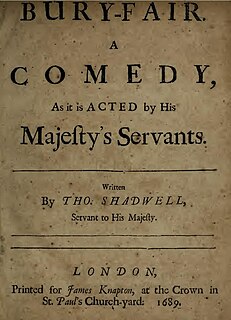
Bury Fair is a 1689 comedy play by the English writer Thomas Shadwell. It is part of the tradition of Restoration Comedy that flourished during the era. It was first staged by the United Company at the Theatre Royal, Drury Lane in London.
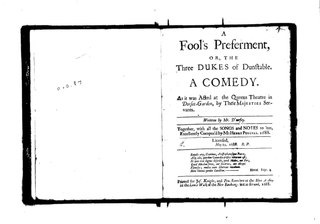
A Fool's Preferment; Or, The Three Dukes Of Dunstable is a 1688 comedy play by the English writer Thomas D'Urfey. It is a reworking of John Fletcher's Jacobean work The Noble Gentleman. It was first performed by the United Company at the Dorset Garden Theatre in London. Henry Purcell composed the play's incidental music. It was his first major work composingfor the theatre in seven years since Sir Barnaby Whigg.

City Politiques is a 1683 comedy play by the English writer John Crowne. It was first performed by the United Company at the Theatre Royal, Drury Lane by the recently formed United Company. The original cast are not known.

Sir Salomon; Or, The Cautious Coxcomb is a 1670 comedy play by the English writer John Caryll. It has often been staged under the title Sir Solomon Single. It was first performed by the Duke's Company at the Lincoln's Inn Fields Theatre in London. It is part of the tradition of Restoration comedy.
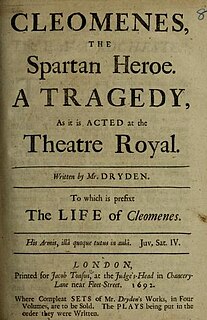
Cleomenes, the Spartan Hero or Cleomenes, The Spartan Heroe: A Tragedy is a 1692 tragedy by the English writer John Dryden. It was first staged at the Theatre Royal, Drury Lane by the United Company. It portrays the reign of Cleomenes, the King of Sparta, inspired by Plutarch's history of the period. Dryden's version is strongly Jacobite in drawing parallels from his overthrow to the recent Glorious Revolution in England. Because of this it was temporarily banned by the authority of Queen Mary.
King Edward The Third; With The Fall Of Mortimer, Earl Of March is a 1690 tragedy, generally attributed to the English writers John Bancroft and William Mountfort. It was first performed by the United Company at the Theatre Royal, Drury Lane in London. It portrays the early years of the reign of Edward III and his defeat and execution of Roger Mortimer, Earl of March.












